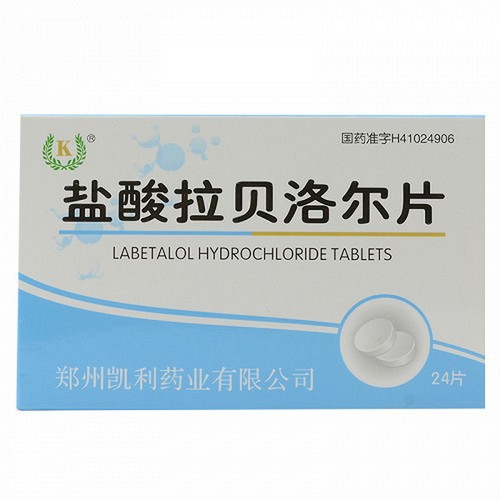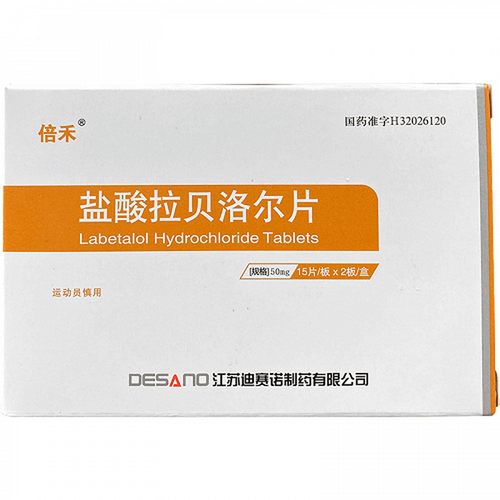Product Overview
[Drug Name]
Generic Name: Bevantolol Hydrochloride Tablets
Trade Name: Carimon
English Name: Bevantolol Hydrochloride Tablets
Chinese Pinyin: YanSuanBeiFanLuoErPian
[Ingredients]
Chemical Name: (±)-1-[3,4-dimethoxyphenethyl]amino-3-(m-tolyloxy)-2-propanol hydrochloride. Chemical Structure: Molecular Formula: C₂O₄H₂O₄NO₄・HCl Molecular Weight: 381.89
[Properties]
50mg: Film-coated tablets, appear white after removal of the coating.
[Indications]
Essential hypertension
[Dosage and Administration]
For oral administration, the usual adult dose is 50mg twice daily. If the antihypertensive effect is insufficient, the dose can be increased to 100mg twice daily. The dose can be adjusted based on the patient's symptoms. <Precautions for Use Related to Dosage and Administration> For patients with pheochromocytoma, this drug should be administered after initial treatment with an alpha-blocker, as monotherapy may cause a sharp increase in blood pressure. This drug should be used in combination with an alpha-blocker.
[Adverse Reactions]
1. Adverse Reactions at the Time of and After Marketing Authorization in Japan: A survey of 4,899 cases at the time of and after marketing authorization in Japan revealed adverse reactions including abnormal clinical test values in 344 cases (7.02%). The main adverse reactions were heart rate and rhythm disturbances such as bradycardia, sinus bradycardia, and palpitations (1.43%), and metabolic and nutritional disturbances such as elevated serum cholesterol and elevated blood uric acid (1.35%). (At the end of the re-examination in June 2006) 2. Serious adverse reactions: (1) Heart failure (less than 0.1%), atrioventricular block (less than 1%), sinus dysfunction (incidence unknown): Because this product can induce heart failure, atrioventricular block, sinus dysfunction (significant sinus bradycardia, sinoatrial block, etc.), patients should be closely observed during medication. If such symptoms occur, appropriate measures such as discontinuation of medication should be taken. (2) Asthma attack, dyspnea (incidence unknown): Because this product can induce and worsen asthma, if such symptoms occur, appropriate measures such as discontinuation of medication should be taken. 3. General adverse reactions: When the following adverse reactions occur, appropriate measures such as reducing the dose or discontinuing the drug should be taken as needed. (1) Frequency of adverse reactions: 0.1% to 1% Nervous system: dizziness, headache, heaviness of the head, drowsiness, insomnia Kidney: increased BUN, increased Cr Liver: abnormal liver function (increased ALT (GPT), increased AST (GOT), etc.) Circulatory system: bradycardia, sinus bradycardia, palpitations, increased cardiothoracic ratio, decreased blood pressure Respiratory system: cough, dyspnea Digestive system: nausea, diarrhea, constipation, thirst Allergic symptoms (note): rash Others: increased uric acid, increased total cholesterol, edema, fatigue, increased CK (CPK), increased blood potassium (2) Adverse reactions Frequency of occurrence: <0.1% Nervous system: dizziness, uneasiness Circulatory system: chest pain, syncope Respiratory system: wheezing Digestive system: nausea, abdominal distension, loss of appetite, abdominal discomfort, vomiting, gastric heaviness, oral irritation Allergic symptoms (Note): eczema, itching Eyes: photopsia-like symptoms Urinary system: difficulty urinating, frequent urination, oliguria Others: fatigue, lower limb weakness, facial flushing (Note): If such symptoms occur, the drug should be discontinued. 4. Other adverse reactions of similar drugs: It has been reported that beta-blockers can cause symptoms such as decreased tear secretion. If such symptoms occur, the drug should be discontinued.
[Contraindications]
The following patients are contraindicated for use of this product: (1) Patients with diabetic ketoacidosis or metabolic acidosis. (It may contribute to the decrease in cardiac contractility, peripheral arterial dilation, and decreased blood pressure caused by acidosis.) (2) Patients with cardiogenic shock. (The cardiac function inhibitory effect of this agent may worsen the symptoms.) (3) Patients with congestive heart failure. (The cardiac function inhibitory effect of this drug may worsen symptoms.) (4) Patients with right heart failure caused by pulmonary hypertension. (The cardiac function inhibitory effect of this drug may worsen symptoms.) (5) Patients with severe sinus bradycardia, II to III degree atrioventricular block or sinoatrial block. (The cardiac function inhibitory effect of this drug may worsen symptoms.) (6) Pregnant women or women who may be pregnant. (Reports of fetal weight reduction have been reported in animal experiments (rats).) (See [Use in Pregnant and Lactating Women]) (7) Patients with untreated pheochromocytoma. (See [Precautions for Use Related to Dosage and Administration])
[Precautions]
1. Use as prescribed and follow the doctor's advice. 2. Use with caution in the following patients: (1) Patients suspected of having congestive heart failure. (Because this product can induce symptoms of heart failure, patients should be closely observed and should be administered with caution when combined with digitalis.) (2) Patients suspected of having bronchial asthma or bronchospasm. (Because this product also has a β2 receptor blocking effect, it can induce symptoms of bronchial asthma and bronchospasm) (3) Patients with primary hypoglycemia, poorly controlled diabetes or patients in a fasting state should pay attention to changes in blood sugar. (Because it is easy to induce hypoglycemia and easily mask hypoglycemic symptoms such as tachycardia, it is necessary to monitor blood sugar levels regularly during medication) (4) Patients with severe renal insufficiency. (Because the blood concentration of bevantolol hydrochloride will increase, it is recommended to start administration from a low dose) (5) Patients with severe hepatic insufficiency. (Because drug metabolism is delayed, the effect of this product is enhanced) (6) Elderly patients (Elderly patients generally have reduced physiological functions such as renal function, and excessive blood pressure should not be lowered, so it is recommended to start administration from a low dose) (See [Medication for the Elderly]) (7) Children (There is a lack of experience in using this drug in children, and safety has not yet been established) (See [Medication for Children]) 3. Important precautions: (1) Cardiac function should be checked regularly during long-term use (pulse, blood pressure, electrocardiogram, X-ray, etc.). If bradycardia or hypotension symptoms are found, the dosage should be reduced or stopped. Atropine sulfate should be used if necessary. At the same time, liver function, renal function and blood counts should be monitored. (2) There are reports that sudden discontinuation of similar drugs (propranolol hydrochloride) in patients with angina pectoris may lead to worsening symptoms or myocardial infarction. Therefore, if the drug needs to be discontinued, the dosage should be gradually reduced and the condition should be closely monitored. Patients should be careful not to stop the drug without the doctor's permission. The elderly should pay special attention to the above matters. (3) It is recommended not to use this product within 48 hours before surgery. (4) Because this product may cause dizziness or unsteady gait, patients taking this product (especially in the early stages of medication) should avoid engaging in dangerous mechanical operations such as driving a vehicle. (5) When adverse reactions occur, measures such as reducing the dosage or discontinuing the drug should be taken as needed. If heart failure occurs, the drug should be discontinued immediately. 4. Precautions during use: When dispensing the drug, the patient should be instructed to take the PTP aluminum foil packaged tablets out of the aluminum foil plate before taking it. (There have been reports of accidental ingestion of aluminum foil. The hard corners of the foil have penetrated the esophageal mucosa, causing perforation and leading to serious complications such as mediastinal sinusitis.)
[Special Population Use]
Precautions for Children:
Safety for children has not been established. (No experience with this medication.)
Precautions for Pregnancy and Lactation:
1. This product is contraindicated in pregnant women and women of childbearing potential. (Reports of reduced fetal weights have been reported in high-dose animal studies (rat studies).) 2. Lactating women should discontinue breastfeeding during this medication period. (Transfer into breast milk has been reported in animal studies (rat studies).
Precautions for the Elderly:
When using this product, elderly patients should be started at a low dose (based on symptoms, such as 50 mg/day). Close observation is recommended during treatment, and cautious dosing is recommended. (See [Precautions 2. Use with caution in the following patients]) 1. Elderly patients often have decreased renal function and other physiological functions, so excessive blood pressure reduction is not recommended. 2. When discontinuing the drug, the dose should be gradually reduced. (See [Precautions 3. Important Precautions])
[Drug Interactions] Drug Name: Other drugs that inhibit the sympathetic nervous system (such as reserpine). Clinical Symptoms/Management: Excessive sympathetic inhibition can lead to symptoms such as bradycardia or hypotension. Therefore, the dose should be reduced and administered with caution. Mechanism/Risk Factors: Potentially potentiates mutual sympathetic inhibition. Drug Name: Hypoglycemic Drugs (including insulin, tolbutamide, etc.). Clinical Symptoms/Management: May enhance the hypoglycemic effect and mask signs of hypoglycemia such as tachycardia. Therefore, blood glucose levels should be monitored and administered with caution. Mechanism/Risk Factors: Beta-blockade can delay recovery from hypoglycemia and mask sympathetic nervous system symptoms associated with hypoglycemia. Drug Name: Calcium Antagonists (including verapamil hydrochloride). Clinical Symptoms/Management: Concomitant use with beta-blockers may enhance the interaction, resulting in excessive hypotension or cardiac suppression. Therefore, caution is advised. Mechanism/Risk Factors: May potentiate the negatively charged hypotensive effect of each other. Drug Name: Clonidine. Clinical Symptoms/Management: Rebound symptoms may be exacerbated after clonidine discontinuation. Therefore, this drug should be temporarily discontinued before clonidine discontinuation. Mechanism/Risk Factors: Discontinuation of clonidine can increase blood norepinephrine levels. Combination with beta-blockers can block the effects of beta-receptors (vasodilation) and enhance the effects of alpha-receptors (vasoconstriction), leading to a sharp increase in blood pressure. Drug Name: Antiarrhythmic Drugs (including disopyramide, procainamide, and ajmaline). Clinical Symptoms/Management: Excessive cardiac suppression may occur, so dose reduction and caution should be used. Mechanism/Risk Factors: Potentially potentiate the mutual inhibitory effect on cardiac function.
[Pharmacological Actions]
Bevenolol Hydrochloride Tablets (Cariwin®) are selective beta-1 blockers with mild alpha-1 blockade and calcium ion antagonism. This drug has a β1 receptor blocking effect approximately 14 times that of α1 receptors and a 4-fold greater α1 receptor blocking effect than its calcium ion antagonist effect. It exhibits stable antihypertensive efficacy and, compared to other β-blockers, exhibits less cardiodepressant effects. It lacks endogenous sympathomimetic activity and has no adverse effects on lipid metabolism, while maintaining membrane stability. In animal studies, this drug demonstrated a stronger antagonist effect against isoproterenol than atenolol and labetalol hydrochloride, and its β1 receptor blocking effect was 11.5-32 times greater than that of β2 receptors. Administration of this drug produces a stable antihypertensive effect in spontaneously hypertensive rats, renal hypertensive rats, and DOCA-salt hypertensive rats.
[Storage]Store at room temperature.
[Strength] 50 mg: Each tablet contains 50 mg of bevantolol hydrochloride
[Packaging Specifications] Inner packaging material: Aluminum foil, polyvinyl chloride
Packaging specifications: 14 tablets/box
[Expiration Period] 24 months
[Approval Number] Imported Drug Registration Number: H20140870
Subpackaging Approval Number: National Medicine Standard J20150138
[Manufacturer] Company Name: Tsukuba Factory, Nihon Pharmaceutical Industry Co., Ltd.






